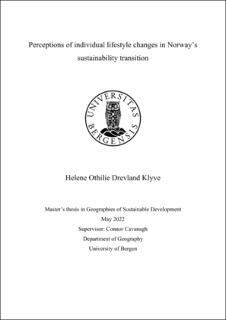Perceptions of individual lifestyle changes in Norway's sustainability transition
Master thesis
Permanent lenke
https://hdl.handle.net/11250/2998943Utgivelsesdato
2022-05-16Metadata
Vis full innførselSamlinger
- Master theses [140]
Sammendrag
By ratifying the Paris Agreement in 2015, Norway pledged to attempt to keep the global temperature rise to below 1.5°C above pre-industrial levels. Through the agreement, Norway has committed to cutting 40% of emissions, compared to 1990s level, by 2030. However, the necessary emission reductions are currently not taking place, therefore, a sustainability transition is needed. This master’s thesis researches how the Norwegian population envisions the sustainability transition to come about, and how they perceive the role of the individual in this transition. Data was gathered from a survey sent out by the Norwegian Citizen Panel and interviews with members of the environmental organisation Spire. The data is analysed by utilising the theoretical framework of multiple environmentalities, which builds upon the concept of governmentality from Foucault. The research contributes to the literature by adapting the framework to a Norwegian context, in the Global North region, where it has not frequently been applied before. The findings in this thesis show that people predominantly rely on the state to initiate a sustainability transition. Individual lifestyle changes are needed but should mostly come through an economy that allows people to consume environmentality friendly. These conclusions are attributed to a Norwegian, and Scandinavian, combination of the sovereign and neoliberal forms of environmentality. The thesis concludes by emphasising the need for rapid action to lower emissions and keep the 1.5°C-target alive.
